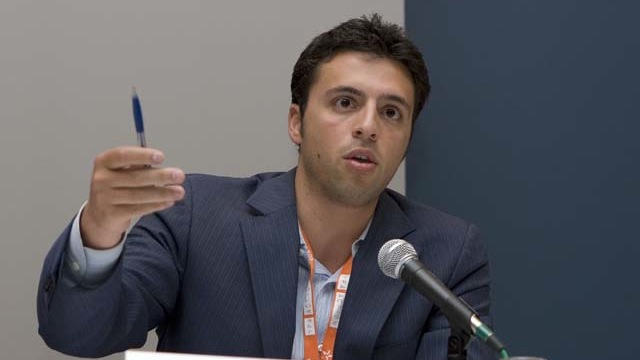
Ezra Klein, Washington Post (for now). Photo courtesy of Son of Broccoli (Flickr).
Ezra Klein is taking his talents to South Beach someplace other than the Washington Post. Klein’s announcement that he’s leaving the Post unless it backs a new expanded platform for him may be news, but it’s not a surprise. He’s simply the latest migrant in the flight of new media superstars — including Bill Simmons, Nate Silver, Sarah Lacy, Andrew Sullivan, and Walt Mossberg and Kara Swisher — who either started their own platforms or convinced existing media brands to support such platforms. The Post now joins the New York Times and Wall Street Journal in resisting the trend and being willing to let the superstars walk. The question is whether they’ll regret standing pat.
As for Klein, online chatter quickly seized upon the “eight figure” number that Klein reportedly asked for as an investment in an expanded Wonkblog-esque platform. Yet the collective gasp this inspired seems based on a misconception: it’s not as though Klein was asking for $10 million for himself. He was asking the Post — and presumably, now, the Post’s new owner, Amazon founder and CEO Jeff Bezos — for $10 million in what amounts to venture capital to build the platform (which would presumably be used to hire editors, writers, operations staff, and web designers); to pay for advertising the new platform; and to hire researchers, since it was clear that Klein wanted the site to focus deeply on the data-driven “explanatory journalism” for which he’s now well-known.
Is $10 million an outlandish request for investment capital here? Sarah Lacy landed $2.5 million in 2012 to start PandoDaily after becoming a prominent writer at TechCrunch, so perhaps Klein’s request was too ambitious — although there is a significant difference between a tech news site like Pando and the research-intensive work that Klein has in mind. Done well, an expanded Wonkblog would have more staff than Pando does. But perhaps Pando was the comparable that Bezos was thinking of when he declined Klein’s offer.
The unknown factor here is exactly what a brand like ESPN gets in return for backing Simmons’s Grantland — and now, an expanded FiveThirtyEight website run by Nate Silver. What’s the return on investment? Are Grantland readers more likely to read ESPN.com coverage even though it’s on a separate domain? Even if they’re not making money on Grantland itself, does it serve as a loss leader that drives traffic to ESPN.com and viewers to, say, ESPN’s coverage of the NBA where Simmons is a studio commentator? ESPN and Simmons have had an occasionally contentious relationship, and yet ESPN (owned by Disney) made a calculated choice to give Simmons the separate Grantland platform along with editorial control, rather than watching him leave. Without knowing how ESPN views the arrangement now, the fact that they were willing to strike a similar deal to lure Silver from the Times may indicate that accommodating the superstar may be a profitable proposition. If ESPN is winning this bet, then the old newspapers are losing it.
What if the superstar goes it alone? Ultimately, the prospect of being able to start a free-standing website is what gives the new media superstars their leverage. This is what makes Andrew Sullivan’s Daily Dish an interesting experiment. The Dish became Sullivan’s exclusive home in early 2013, with some free content and monthly and yearly subscription plans for full access. This is a route that the other superstars haven’t chosen: Grantland has advertising, Pando has sponsored content, and Re/code (the new NBC-backed channel that Mossberg and Swisher have just started) already has advertising as well (and, fittingly, an interview with Simmons on his pioneering podcasting). None of them have subscriptions. Yet.
Sullivan’s ad-free “Deep Dish” subscription experiment seems to be working so far. Mashable reported yesterday that Sullivan pulled in $875,000 from subscriptions last year, near his goal, but the question will be how many of the subscribers choose to renew. With a relatively small staff, this may be a sustainable revenue flow, but one only available for a well-known writer like Sullivan, whose readers would follow him wherever he went.
That’s ultimately the key: reader loyalty. Readers have made it clear that they’ll follow certain writers regardless of what institution (if any) they write for, and if they’re also willing to vote with their credit cards as well as their web browsers, then the superstars will have the edge. And if that’s the case, it will represent a significant problem for old media brands that already have a problem portfolio that dwarfs Jay-Z’s. Jeff Bezos may have represented the promise of bringing new-economy savvy to the Post, but he’s ultimately cast his lot with his print brethren rather than with ESPN and NBC. If the current divide holds true, perhaps Klein’s next stop will be a partnership with CBS, ABC, or CNN, with a free-standing website plus cross-branding and TV appearances for Klein. Have readers, will travel.
